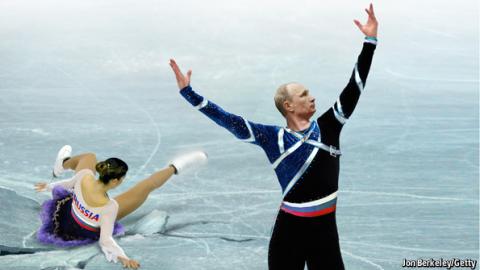Russia can break out of Putin’s thrall
This theory has strengths and weaknesses. It rightly emphasises the importance of domestic factors in the way that Russia formulates and conducts its foreign policy. On the other hand, it risks falling into the conceptual error of confusing an authoritarian strongman with an entire society, as if the wills of Mr Putin and 140m-plus Russians are one and the same.
The assumption that Mr Putin is hugely popular with the Russian people — who endorse his ever more militaristic foreign policy — deserves more scrutiny than it receives from western political, academic and media circles. First, a system of government that restricts political competition and controls freedom of expression as methodically as in Russia is not a system where popularity means what it does in the west.
Second, Russians are little different from everyone else in judging their rulers by how they improve or harm the quality of life. What mainly matters is a government’s economic and social record, not its foreign policy adventures, which can be exciting but tend after a while to fade in attractiveness. Russia’s economy suffers from a shrinking labour force, woeful productivity, over-dependence on natural resources, too little investment and innovation, capital flight, ubiquitous corruption and a wretched parody of the rule of law. Measures that might minimise the impact of these deficiencies on Russian living standards are unimaginable, for they would require less confrontation with the west and less stifling domestic political conditions.
Since Mr Putin’s managed re-election in 2012, the president and his increasingly narrow circle of courtiers have tightened their grip on power by cracking down on internal dissent and pursuing an anti-western foreign policy. The prospects for economic reform are correspondingly dim, with all that implies for lower living standards and the longer-term stability of Putinism.
Crimea’s annexation went down well with millions of Russians, even more so than the August 2008 war with Georgia. In March 2014, some 58 per cent of people questioned in a Levada-Center survey (the organisation is Russia’s most reputable pollster) supported annexing parts of neighbouring countries with ethnic Russian minorities. By last March, however, this figure had fallen to 34 per cent. Meanwhile, 64 per cent of Russians — up from 56 per cent in 2009 — opposed the use of any means, including force, to keep former Soviet republics under Moscow’s control.
Such surveys show that the Russian public does not blindly follow the Kremlin in all respects. Much opinion appears receptive to the western concept of international relations as a civil and commercial sphere as much as a political and military arena. The west should encourage this outlook by keeping channels open to Russian society.
We must be realistic. Mr Putin and his entourage are not beholden to a freely elected legislature or to public opinion in the manner of a western government. They have travelled so far down the road of internal and external confrontation that it will be hard to pull back. Fixed on burnishing Russia’s global prestige, smashing their domestic critics and reaping the private rewards of public office, they will serve us, for the time being, the same dreary propaganda diet about a hostile, degenerate west and its fifth columnist stooges.
Western governments must persist with a mix of firmness, unity of purpose towards Moscow and a long-term effort to make a successful state of Ukraine. They should avoid playing into Mr Putin’s hands by interpreting today’s troubles with Russia as evidence of some mortal contest between rival models of civilisation. Moscow and the west are at odds not because they are two irreconcilable value systems and types of people, but mainly because an unusually malignant power apparatus controls the Kremlin. The west must be patient and keep its political antennas alert for the day — remote as it may seem while Mr Putin is in power — when Russia’s evolving internal conditions create the space to reduce international tensions.
Tony Barber

